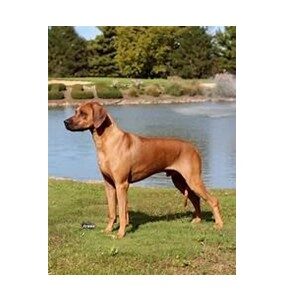Dog Bed For A Rhodesian Ridgeback
Make Your Ridgeback Comfortable with A Bed!
Introduction
A dog bed for a Rhodesian Ridgeback takes into account their health conditions, sleeping style, and preferences. Their size makes an orthopedic bed best choice.
The Rhodesian Ridgeback, also known as the “African Lion Dog,” is a powerful and noble breed with a rich history rooted in Southern Africa. Originally bred to hunt large game, including lions, these dogs are known for their courage, endurance, and protective instincts.
Their most distinctive feature is the ridge of hair running along their back, which grows in the opposite direction of the rest of their coat, giving the breed its name. Rhodesian Ridgebacks are large, muscular dogs, typically weighing between 65-90 pounds, with a sleek, wheaten-colored coat that requires minimal grooming.
Despite their hunting background, Ridgebacks are loyal family companions, known for their affectionate nature and calm demeanor around the home. This breed is ideal for active families or individuals who can provide the mental and physical stimulation they need.
While they are calm indoors, they require daily exercise to stay healthy and prevent boredom-related behaviors. Ridgebacks are also known for their independent nature, so early training and socialization are critical to raising a well-behaved adult.
Their protective instincts make them natural guard dogs, but they are generally reserved and gentle with those they trust. New owners should be aware of their potential for stubbornness and ensure they are consistent and patient with training.
The Rhodesian Ridgeback is a unique, strong-willed breed that, with the right care and guidance, can make a loyal, loving addition to any family.
In this guide, we share information about the Rhodesian Ridgeback that new owners may not know about. Topics include best dog bed types, best brands, facts, fun facts, health issues, behavior concerns, tips for new owners, costs of ownership, and safe foods and foods to avoid.
Best Dog Bed Types
Here are some of the best dog bed types for Rhodesian Ridgebacks:
- Orthopedic Dog Beds
- Why: Rhodesian Ridgebacks are large dogs prone to joint issues like hip dysplasia and arthritis as they age. Orthopedic beds with memory foam provide the support needed for their joints.
- Features to Look For: Thick memory foam, non-slip base, and easy-to-clean covers.
- CurtiPUR-US Seal: When purchasing an orthopedic or memory foam bed, be sure to look for the CertiPUR-US seal. This seal means the materials used in making the bed do not contain any toxins or chemicals that are harmful to humans and pets.
- Bolster Beds
- Why: These beds offer a raised edge or “bolster” around the perimeter, which provides a sense of security and extra neck and head support.
- Features to Look For: Soft, plush bolsters, durable fabric, and removable, washable covers.
- Cooling Gel Beds
- Why: Rhodesian Ridgebacks can overheat due to their short coat and active nature. A cooling gel bed helps regulate body temperature during hot weather.
- Features to Look For: Cooling gel layers, water-resistant cover, and durability.
- Elevated Dog Beds
- Why: These beds keep dogs off the ground, providing better airflow and a cooler sleeping surface. They are also ideal for outdoor use.
- Features to Look For: Sturdy frame, durable mesh fabric, and easy assembly.
- Waterproof/Outdoor Beds
- Why: If your Rhodesian Ridgeback enjoys spending time outside, a waterproof bed will keep them comfortable while resisting outdoor elements like moisture and dirt.
- Features to Look For: Waterproof cover, UV-resistant fabric, and easy-to-clean materials.
- Pillow or Mattress-Style Beds
- Why: A simple and comfortable option, these beds give enough room for a Rhodesian Ridgeback to stretch out fully.
- Features to Look For: High-density foam or thick padding, large size, and durable, washable covers.
Look for beds that match your dog’s size, sleeping style, and any special health concerns, like joint support.
Best Brands
For Rhodesian Ridgeback owners, selecting a dog bed that provides ample support and durability is crucial due to their large size and active nature. Here’s a list of reliable dog bed brands you can trust:
- Big Barker
- Known for orthopedic dog beds specifically designed for large and giant breeds.
- Provides superior joint support, which is important for active dogs like Rhodesian Ridgebacks.
- Features a 10-year warranty for foam integrity.
- PetFusion
- Offers memory foam dog beds with water-resistant covers.
- Ideal for older Ridgebacks or those with joint issues.
- Comes with non-skid bottoms and supportive bolsters for added comfort.
- Kuranda
- Known for elevated, chew-resistant beds.
- Great for dogs who like to stay cool and enjoy elevation.
- Highly durable, making it a good choice for active and playful Rhodesian Ridgebacks.
- Brindle
- Specializes in orthopedic memory foam beds.
- Lightweight and easy to move, but still supportive enough for large dogs.
- Has a waterproof layer to protect against accidents.
- BarksBar
- Offers orthopedic beds with cotton-padded rim cushion for head support.
- Affordable yet durable, providing comfort for large breed dogs.
- Designed with non-slip rubber backing to keep the bed in place.
- K&H Pet Products
- Provides both orthopedic and heated dog beds.
- Their orthopedic foam beds are especially beneficial for joint relief.
- Offers a range of options from heated beds to elevated cot-style beds.
- Furhaven
- Offers a variety of bed styles including orthopedic, memory foam, and cooling gel.
- Budget-friendly options that still provide comfort for large breeds.
- Available in various shapes and sizes to fit different needs.
- Majestic Pet
- Focuses on pillow-style beds with polyfill for maximum cushioning.
- Machine washable covers, making it easy to maintain.
- Available in extra-large sizes suitable for Rhodesian Ridgebacks.
These brands provide excellent options in terms of durability, comfort, and joint support—key features to consider when purchasing a dog bed for a Rhodesian Ridgeback.
Video: Pros and Cons of the Rhodesian Ridgeback Dog
The video shows the pros and cons of the Rhodesian Ridgeback dog and is helpful for potential new dog owners to decide if they want to own one.
Facts and Fund Facts About The Rhodesian Ridgeback
Here are some lesser-known facts about the Rhodesian Ridgeback that new or potential owners may not be aware of:Measurements:
- Size: Medium-Large
- Group: Hound Group
- Height Male: 25 – 27 inches
- Height Female: 24 – 26 inches
- Weight Male: 85 lbs.
- Weight Female: 70 lbs.
- Length Male: 38 – 42 inches
- Length Female: 38 – 42 inches
- Lifespan: 10 – 12 years
- Colors: Light Wheaten, Light Wheaten Black Nose, Light Wheaten Brown Nose, Red Wheaten, Red Wheaten Black Nose, Red Wheaten Brown Nose, Wheaten, Wheaten Black Nose, Wheaten Brown Nose
- Popularity: This breed is the 41st most popular in the United States according to the American Kennel Club in 2023.
- Intelligence: This breed is the 52nd most intelligent breed as ranked by Professor Stanley Coren at the University of British Columbia.
- Not All Have Ridges: Interestingly, not all Rhodesian Ridgebacks are born with the distinctive ridge of hair along their backs. Ridgeback puppies without the ridge are still purebred but cannot be shown in conformation events.
- Moderate Grooming Needs: Despite their short coat, Ridgebacks shed moderately year-round. Regular brushing with a soft bristle brush or grooming mitt can help control shedding.
- High Prey Drive: Ridgebacks have a natural instinct to chase, stemming from their history as hunting dogs. This prey drive means they may chase small animals like cats or squirrels if not properly trained.
- Sensitive Souls: While they are tough on the outside, Rhodesian Ridgebacks are quite sensitive emotionally. Harsh training methods can be counterproductive, as they respond best to positive reinforcement.
- Prone to Bloat: Like many deep-chested breeds, Rhodesian Ridgebacks are susceptible to bloat (gastric torsion), a life-threatening condition. Owners should be aware of the signs and take preventive measures, like feeding smaller, more frequent meals.
- Great with Children: Ridgebacks can be excellent family dogs and are often patient and gentle with children, but due to their size and strength, supervision is necessary around younger kids.
- History of Guarding: In addition to hunting, Rhodesian Ridgebacks were also used by African settlers to guard homesteads. Their protective instinct makes them natural watchdogs.
- Heat and Cold Sensitivity: Although they tolerate heat better than many breeds, Ridgebacks are not well-suited for cold weather due to their short coat. They may need a dog coat or blanket in cooler climates.
- Slow Maturity: Rhodesian Ridgebacks mature slowly, both physically and mentally. They can remain puppy-like and rambunctious for up to three years, requiring patience during their extended adolescence.
- Socialization is Key: Ridgebacks can be reserved or aloof with strangers if not properly socialized from an early age. Early and consistent socialization helps them become well-rounded and confident adults.
- Not Naturally Swimmers: Unlike many large breeds, Rhodesian Ridgebacks are not natural swimmers. While they can be taught to swim, they don’t have an innate love for water and may need encouragement to enjoy it.
- Highly Intelligent, But Stubborn: Ridgebacks are very intelligent, capable of learning quickly. However, their independence and stubborn streak mean they may choose to ignore commands if they don’t see a reason to follow them.
- Rhodesian Ridgebacks Only Come in One Color: Although you’ll see coats in what appears to be varied colors, they’re really just all the different shades, from pale flax to deep auburn. The breeds acceptable colors are light wheaten to red wheaten.
These facts provide insight into some of the unique challenges and characteristics that come with owning a Rhodesian Ridgeback, helping new owners prepare for life with this remarkable breed.
Fun Facts
Here are 12 fun facts about the Rhodesian Ridgeback:- African Lion Hound: Rhodesian Ridgebacks were originally bred in southern Africa to help hunt lions. They’re sometimes called “African Lion Hounds” because they would track and corner lions until hunters arrived.
- Distinctive Ridge: The breed gets its name from the unique ridge of hair running along its back, growing in the opposite direction from the rest of the coat.
- Fiercely Loyal: Ridgebacks are known for their unwavering loyalty to their families. They are protective without being overly aggressive.
- Minimal Barkers: These dogs tend to bark less compared to other breeds, making them quieter companions. They will alert when necessary but are generally calm and composed.
- Athletic and Agile: Ridgebacks are highly athletic and need plenty of exercise. Their muscular build makes them excellent runners, especially known for their endurance.
- Ancient Ancestry: The breed’s ancestors were dogs kept by the Khoikhoi people of southern Africa. These early dogs were crossed with European breeds brought by settlers.
- Sun Lovers: Rhodesian Ridgebacks love the sun and often seek out sunny spots to bask in. Their short coat helps them tolerate warmer climates better.
- Strong-Willed: Ridgebacks are intelligent but can be independent and stubborn, requiring a confident and consistent owner to train them effectively.
- Versatile Hunters: Originally bred for big game hunting, Ridgebacks are skilled hunters and trackers but are now more commonly family pets and companions.
- Velcro Dogs: Despite their independent nature, they tend to be quite affectionate and love being close to their humans, earning them the nickname “Velcro dogs.”
- Excellent Jumpers: Ridgebacks can leap quite high and are capable of clearing fences or obstacles with ease, so securing your yard is essential!
- Lifespan Surprise: Despite being a large breed, Ridgebacks often live longer than expected, with many reaching 10-12 years or more with proper care and a healthy lifestyle.
Common Health Issues
The most common health issues affecting Rhodesian Ridgebacks include:- Hip Dysplasia: A common joint issue in larger dogs, where the hip joint doesn’t fit properly, leading to arthritis and mobility issues over time.
- Elbow Dysplasia: Similar to hip dysplasia, this affects the elbow joints, leading to lameness or arthritis in the front limbs.
- Dermoid Sinus: A genetic skin condition where a tube-like sinus forms under the skin, often associated with the ridge along their back.
- Hypothyroidism: A condition where the thyroid gland doesn’t produce enough hormones, leading to weight gain, lethargy, and skin issues.
- Degenerative Myelopathy: A progressive disease that affects the spinal cord, leading to hind limb weakness and eventual paralysis.
- Bloat (Gastric Dilatation-Volvulus): A life-threatening condition where the stomach fills with gas and can twist, cutting off blood flow.
- Juvenile Myoclonic Epilepsy: A genetic form of epilepsy that can cause seizures in young dogs.
- Cataracts: Rhodesian Ridgebacks may develop cataracts, leading to vision impairment and, in severe cases, blindness.
- Allergies: They may suffer from food, skin, or environmental allergies, leading to itching, rashes, or ear infections.
Common Behavior Concerns
Here’s a list of the most common behaviors that new Rhodesian Ridgeback owners should be aware of:- Strong Prey Drive: Rhodesian Ridgebacks have a high prey drive due to their hunting background, which can make them chase smaller animals like cats or squirrels.
- Independent Nature: They are known for their independence and strong-willed personality, which can make them seem stubborn during training.
- Protectiveness: Ridgebacks are naturally protective of their families and can be wary of strangers, making early socialization essential to prevent over-guarding.
- Aloofness with Strangers: While they are affectionate with their families, Ridgebacks can be reserved and aloof toward people they don’t know.
- Energetic but Calm Indoors: They need plenty of exercise outdoors but are generally calm and laid-back when indoors, making them suitable for active families with space for play.
- Pack Mentality: Ridgebacks are loyal to their family pack and may experience separation anxiety if left alone for long periods.
- Playful but Not Hyperactive: While they love playing, they aren’t overly hyper or needy, preferring balanced activities with quiet time.
- Vocal Tendencies: Although not excessive barkers, they may alert their owners to something unusual, making them good watchdogs.
- Chewing and Destructive Behavior: Without proper exercise and mental stimulation, they can become bored and resort to chewing or destructive behaviors.
- Dominance Issues: They need firm but kind leadership, as they can test boundaries and assert dominance if not properly trained.
Tips for New Owners
Here are some useful tips for new Rhodesian Ridgeback owners:11. Training & Treats: When training a Ridgeback, be sure to use positive reinforcement in their training sessions. Treats and positive praise works well. Remember, treats should not exceed more than 10% of their daily caloric needs for the day. This helps to prevent them from gaining weight and become obese. By sharing these tips, new owners can ensure their Rhodesian Ridgeback is happy, healthy, and well-behaved.
Costs of Ownership
Here’s a breakdown of the average costs new Rhodesian Ridgeback owners can expect and need to budget for:-
Initial Purchase or Adoption Fee
- Breeder: $1,500 – $2,500 depending on pedigree, location, and breeder reputation.
- Adoption: $200 – $500 from a rescue or shelter.
-
Initial Veterinary Costs
- Initial Checkup and Vaccinations: $150 – $300 (for first-year vaccinations, microchipping, and deworming).
- Spaying/Neutering: $200 – $500 depending on location and clinic.
-
Food
- High-Quality Dog Food: $50 – $75 per month, which adds up to $600 – $900 annually.
-
Dog Bed and Accessories
- Dog Bed: $50 – $200 depending on size and brand.
- Collar, Leash, and Harness: $20 – $60.
- Toys: $50 – $100 initially, with potential replacements throughout the year.
-
Training
- Obedience Classes: $100 – $300 for group sessions.
- Private Training: $50 – $100 per hour, depending on the trainer’s experience and location.
-
Grooming Supplies
- Basic Grooming Tools: $20 – $50 (for brushes, nail clippers, etc.).
- Professional Grooming (Optional): $40 – $80 per session (although Ridgebacks are low-maintenance and don’t require frequent professional grooming).
-
Health Insurance (Optional)
- Pet Insurance: $30 – $60 per month, depending on coverage and the provider, totaling $360 – $720 annually.
-
Routine Veterinary Care
- Annual Exams: $100 – $200.
- Flea/Tick Prevention and Heartworm Medications: $200 – $300 annually.
-
Miscellaneous
- License and Registration: $10 – $20 annually, depending on local regulations.
Estimated Total Initial Costs:
- Purchase Price (with adoption): $2,000 – $3,600 (first year including adoption or breeder costs).
- Annual Maintenance: $1,200 – $1,800 (for food, vet visits, grooming, and supplies).
Safe Foods and Foods to Avoid
Here’s a list of safe foods and foods to avoid for Rhodesian Ridgebacks:Safe Foods:
- Lean meats (chicken, turkey, and beef) – cooked without seasoning or bones.
- Fish (salmon, sardines) – rich in omega-3, cooked and deboned.
- Eggs – a good source of protein, served cooked.
- Carrots – a crunchy snack that is good for dental health and eyesight.
- Pumpkin – helps with digestion and is good for dogs with sensitive stomachs.
- Sweet potatoes – rich in vitamins and fiber.
- Blueberries – packed with antioxidants.
- Apples – a source of fiber and vitamins (remove the seeds).
- Green beans – a low-calorie snack full of vitamins and fiber.
- Plain yogurt – a good source of calcium and probiotics.
Foods to Avoid:
- Chocolate – contains theobromine, toxic to dogs.
- Onions and garlic – can cause anemia by damaging red blood cells.
- Grapes and raisins – toxic and can cause kidney failure.
- Avocados – contain persin, which can be harmful in large amounts.
- Alcohol – even small amounts can be poisonous.
- Caffeine – stimulants like coffee, tea, or energy drinks can be dangerous.
- Macadamia nuts – toxic to dogs, can cause weakness and vomiting.
- Cooked bones – can splinter and cause choking or intestinal damage.
- Xylitol (artificial sweetener) – found in sugar-free products, can cause rapid insulin release and liver failure.
- Raw yeast dough – can expand in their stomach and produce alcohol, which is toxic.
Conclusion
Owning a Rhodesian Ridgeback is a rewarding experience, but it comes with its own set of challenges and responsibilities. New owners should be prepared to meet the physical and mental needs of this energetic and intelligent breed.
Regular exercise is crucial for keeping them healthy and preventing destructive behaviors. Whether it’s through long walks, runs, or interactive play, a well-exercised Ridgeback is more likely to be relaxed and content at home.
Mental stimulation is just as important—providing toys, puzzles, and even agility training can help keep their sharp minds engaged. Training is an essential part of raising a Rhodesian Ridgeback.
Their independent nature can sometimes come across as stubbornness, but with consistent, positive reinforcement, they can be trained to be obedient and well-mannered. Socialization from a young age is key to helping them feel comfortable around strangers and other animals. Without proper socialization, they may become overly protective or territorial.
Ridgebacks are naturally inclined to guard their families, but early exposure to different environments and people will help them understand when it’s necessary to act on those instincts and when to remain calm.
Health is another consideration for new owners. While Rhodesian Ridgebacks are generally a healthy breed, they can be prone to certain conditions, such as hip dysplasia and dermoid sinus. Regular veterinary checkups and a balanced diet will go a long way in ensuring their long-term well-being.
Additionally, new owners should be mindful of the costs involved in raising a large dog, from food and vet bills to training and supplies. Ultimately, Rhodesian Ridgebacks are loyal, protective, and loving companions.
With proper care, training, and attention, they can thrive in a family environment and become a cherished member of the household.
New owners who are willing to invest time and energy into meeting their needs will find that the bond formed with a Ridgeback is one of deep loyalty and affection.
You can read about our other dog breed information articles by clicking HERE!
Shop Dog Beds
Shop dog beds for your dog by selecting or clicking on any bed of choice. You will be taken to Amazon where you can read customer reviews and answered questions and place the order.
As an Amazon Associate, I earn from qualifying purchases. Your purchase price is the same as if you shop directly on Amazon.
The price at time of publish is included below to give you an idea of what the price is; however, it is subject to change.
Shop Rectangle Dog Beds
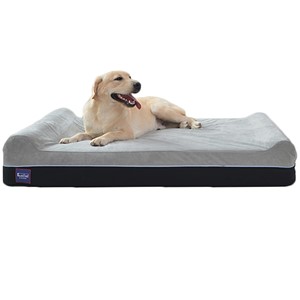
Laifug Large Grey Orthopedic Rectangle Bed
Price At Time of Publish $130.00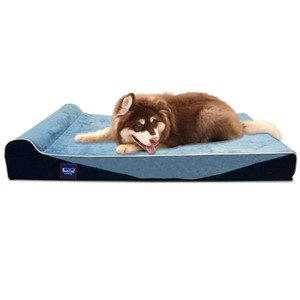
Laifug Large Blue Orthopedic Rectangle Bed
Price At Time of Publish $130.00 $110.00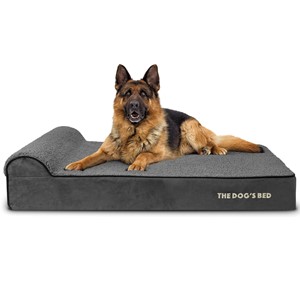
The Dogs Bed XL Grey Orthopedic Rectangle Bed
Price At Time of Publish $130.00 $185.00
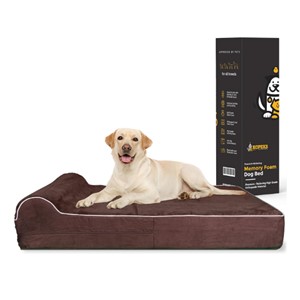
KOPEKS Jumbo Orthopedic Rectangular Bed
Price At Time of Publish $130.00 $110.00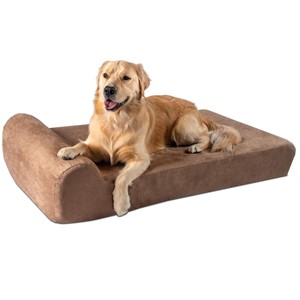
Big Barker XL Orthopedic Rectangle Bed
Price At Time of Publish $130.00 $240.00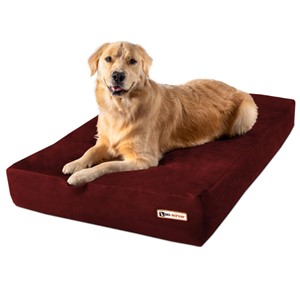
Big Barker XL Burgundy Orthopedic Rectangle Bed
Price At Time of Publish $130.00 $200.00
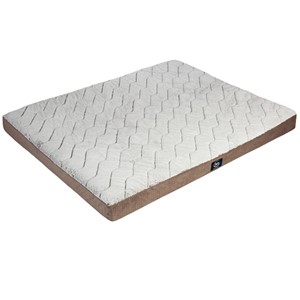
Serta XL Brown Orthopedic Rectangle Bed
Price At Time of Publish $130.00 $80.00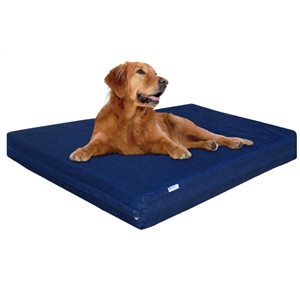
DogBed4Less XL Blue Orthopedic Rectangle Bed
Price At Time of Publish $130.00 $80.00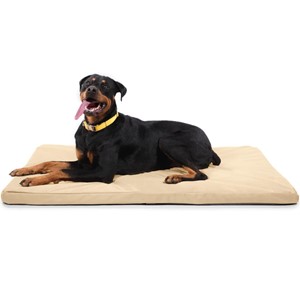
K9 Ballistics XL Sandstone Orthopedic Crate Pad
Price At Time of Publish $130.00 $159.00
Shop Bolster Dog Beds
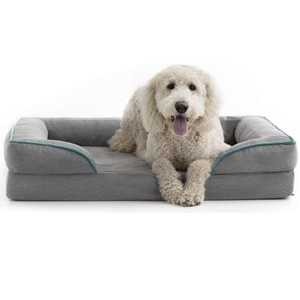
Brindle XL Gray Orthopedic Bolster Bed
Price At Time of Publish $130.00 $79.00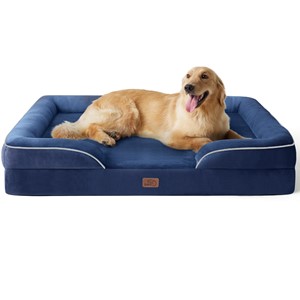
Bedsure XL Blue Orthopedic Bolster Bed
Price At Time of Publish $130.00 $76.00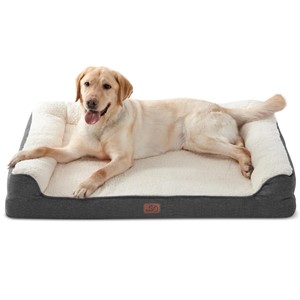
Bedsure XL Grey Orthopedic Bolster Bed
Price At Time of Publish $130.00 $60.00
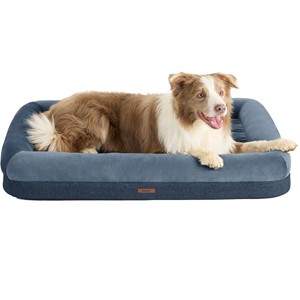
Lesure XL Navy Orthopedic Bolster Bed
Price At Time of Publish $130.00 $40.00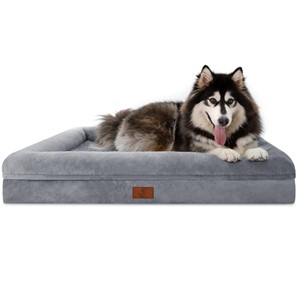
Yiruka XL Grey Orthopedic Bolster Bed
Price At Time of Publish $130.00 $55.00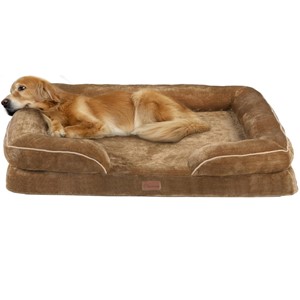
Yitahome XL Brown Orthopedic Bolster Bed
Price At Time of Publish $130.00 $37.00
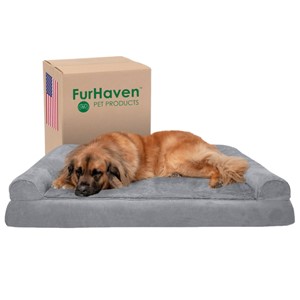
Furhaven XL Gray Orthopedic Bolster Bed
Price At Time of Publish $130.00 $130.00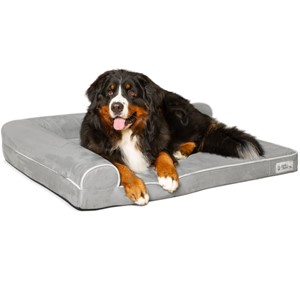
PetFusion XL Grey Orthopedic Bolster Bed
Price At Time of Publish $130.00 $60.00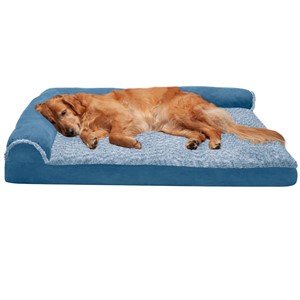
Furhaven Jumbo Blue Orthopedic Bolster Bed
Price At Time of Publish $130.00 $60.00
Shop Elevated Dog Beds
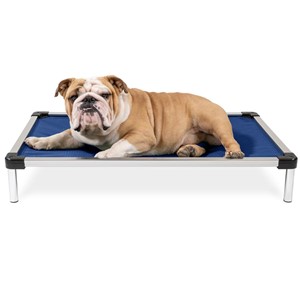
K9 Ballistics Chew Proof Elevated Small Bed
Price At Time of Publish $130.00 $129.00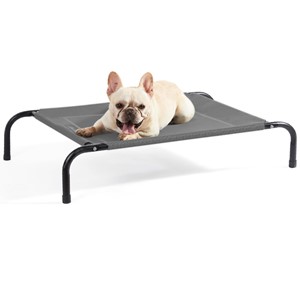
Bedsure Medium Elevated Dog Bed
Price At Time of Publish $130.00 $33.00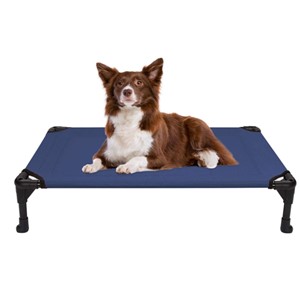
Veehoo Medium Elevated Dog Bed
Price At Time of Publish $130.00 $45.00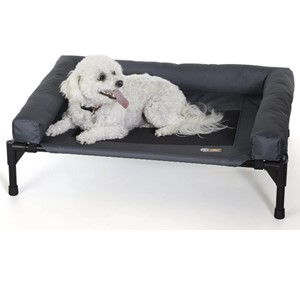
K&H Pet Products Elevated Bolster Dog Bed
Price At Time of Publish $130.00 $57.00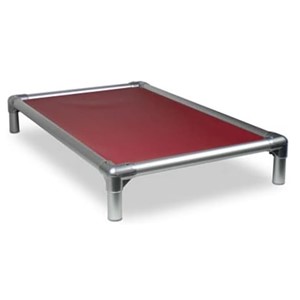
Kuranda Elevated Chew Proof Small Dog Bed
Price At Time of Publish $130.00 $134.00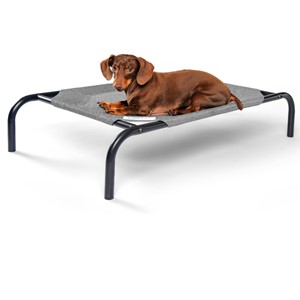
Coolaroo Small Elevated Dog Bed
Price At Time of Publish $130.00 $21.00
Related Articles
Below are some other articles you may be interested in reading. Just select on the topic of interest to learn more about it.- Best Healthy Dog Food Brands
- Christmas Presents for My Dog
- Crates for Dogs
- Critical Signs Your Dog Needs Help
- Dog Training Techniques
- How To Train a Puppy
- Positive Reinforcement for Dog Training
- Puppy Proofing Your House
- Training Dog with Treats
- Using Alexa for Dog Behaviors
